Looking for niche-specific SEO strategies? Jump to this section.
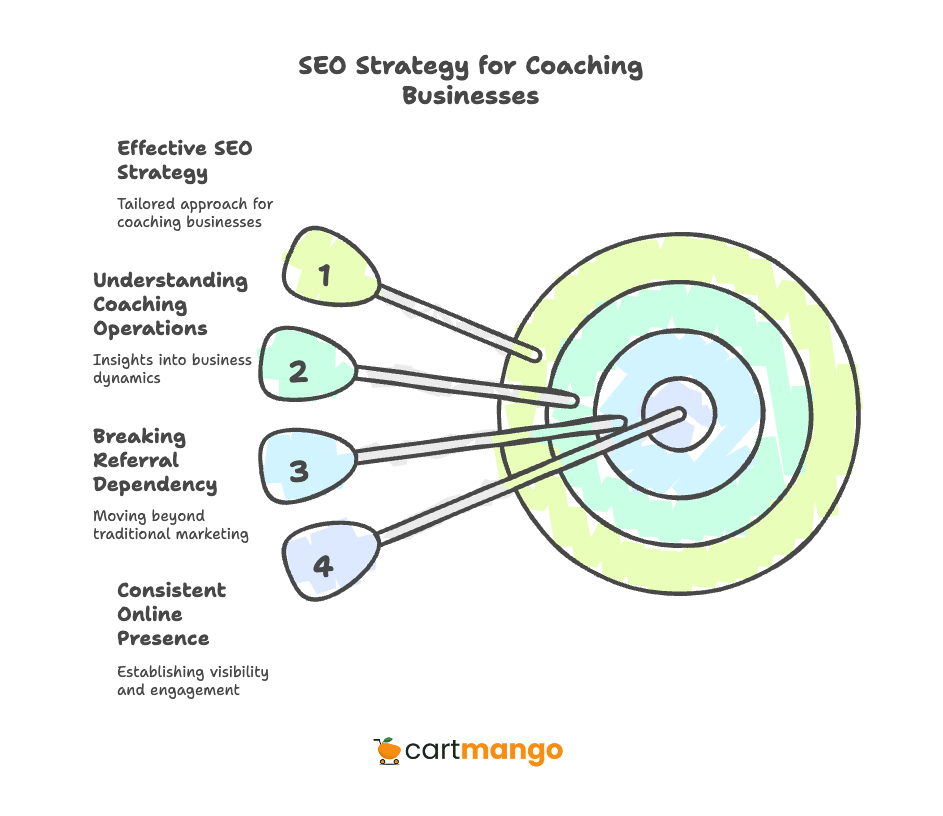
Why Coaches Struggle with SEO
Most coaches are spinning their wheels when it comes to online visibility.
They still rely primarily on referrals and word-of-mouth marketing, struggling to establish a consistent online presence.
The problem isn’t that SEO doesn’t work for coaches.
The problem is that most coaches are following generic SEO advice that completely ignores how coaching businesses actually operate.
Today I’m sharing the exact 90-day system that’s helped hundreds of coaches break free from the feast-or-famine cycle of referral-only marketing.
The Coach’s 15-Minute Keyword Research System
You don’t need expensive tools or complex strategies to find keywords that actually bring you coaching clients.
My 15-minute system starts with something you already use every day. Google’s autocomplete feature is pure gold for discovering what people actually search for when they need coaching help.
Step 1: The Google Autocomplete Method
Type “[your niche] coach” into Google and watch the magic happen. Google shows you the exact phrases people are typing right now. For life coaches, you’ll see searches like “life coach for anxiety” or “life coach for women over 40.”
Don’t stop at the obvious terms. Try variations like “how to find a [niche] coach” or “[problem] coaching near me.” These longer phrases are easier to rank for and bring more qualified leads.
Step 2: Mine the “People Also Ask” Section
This section appears right after you search for your main keyword. Each question reveals a different angle people use when searching for coaching help. Click on each question to reveal even more related searches.
I’ve found my best content ideas hiding in these questions. They show you exactly what concerns potential clients have before hiring a coach.
Step 3: AnswerThePublic
Head over to AnswerThePublic and enter your main coaching keyword. This free tool generates hundreds of question-based searches that people are actually typing into Google.
The visual wheel format makes it easy to spot patterns. You’ll notice that certain problems come up repeatedly across different question types. Those are your golden opportunities.
–
Combining multiple free tools can beat using one expensive option. The key is knowing which data to focus on and which to ignore.
Your 15-Minute Action Plan:
- Spend 5 minutes on Google autocomplete for your niche
- Spend 5 minutes collecting “People Also Ask” questions
- Spend 5 minutes on AnswerThePublic for question-based keywords
Save everything in a simple spreadsheet. You’ll use these keywords throughout your content creation process.
SEO Strategies for The Top 10 Coaching Niches
The biggest mistake I see coaches make is trying to rank for the same generic terms as everyone else. “Life coach” has millions of search results. “Anxiety coach for working mothers” has thousands.
Each coaching niche has unique search patterns and client behaviors. What works for executive coaches might not work for parenting coaches.
Coaching Niche | Primary Keywords | Content Focus | Special Considerations |
|---|---|---|---|
Executive/Leadership | – “executive coach [city]” – “executive presence coaching” | – ROI case studies – Thought leadership articles – Corporate transformation stories | Target corporate districts and business centers |
Career | – “career coach near me” – “career transition coaching” – “resume writing services [city]” | – Job market trends – Salary negotiation guides – Industry-specific advice | Seasonal strategy: New Year, graduation content |
Life | – “life coach for [demographic]” – “personal development coaching” – “work-life balance coach” | – Transformation stories – Goal-setting frameworks – Mindset articles | Target specific life stages (midlife, young adults, retirees) |
Business | – “business coach for startups” – “entrepreneurship coaching” – “small business mentor” | – Business growth strategies – Startup challenges – Scaling advice | B2B approach with industry-specific content |
Health/Wellness | – “health coach near me” – “wellness coaching online” – “nutrition coaching” | – Holistic health approaches – Meal planning guides – Fitness integration | Health claims regulations and disclaimers |
Financial | – “financial coach vs financial advisor” – “money management coaching” – “debt elimination coach” | – Budgeting guides – Investment basics – Debt reduction strategies | Emphasize certifications and credentials |
Relationship/Marriage | – “marriage counseling vs coaching” – “relationship coach online” – “couples therapy alternative” | – Communication techniques – Conflict resolution – Dating advice | Professional boundaries and therapy referrals |
Mental Health/Mindset | – “anxiety coach for adults” – “confidence coaching techniques” – “stress management coaching” | – Coping strategies – Resilience building – Positive psychology | Mental health disclaimers and referral guidelines |
Parenting | – “parenting coach for difficult children” – “positive parenting coaching” – “mom coach near me” | – Discipline strategies – Developmental stages – Work-parent balance | Target new parents, single parents, working mothers |
Sales | – “sales coach for real estate agents” – “sales performance coaching” – “B2B sales coaching” | – Sales techniques – Pipeline management – Objection handling | Industry targeting: real estate, insurance, SaaS, retail |
I remember when I first saw this data broken down by niche. The patterns jumped out immediately.
- Executive coaches need to focus on measurable business outcomes.
- Parenting coaches need to address specific age-related challenges.
Your niche determines everything from your keyword strategy to your content calendar.
- Health coaches should create seasonal content around New Year wellness goals.
- Career coaches should publish job search content in January and graduation season.
The compliance considerations matter more than most coaches realize.
- Mental health coaches need different disclaimers than business coaches.
- Financial coaches must be careful about giving investment advice without proper licenses.
Specialized content consistently outperforms generic approaches. The more specific you get, the easier it becomes to rank and convert.
The 4-Piece Content System
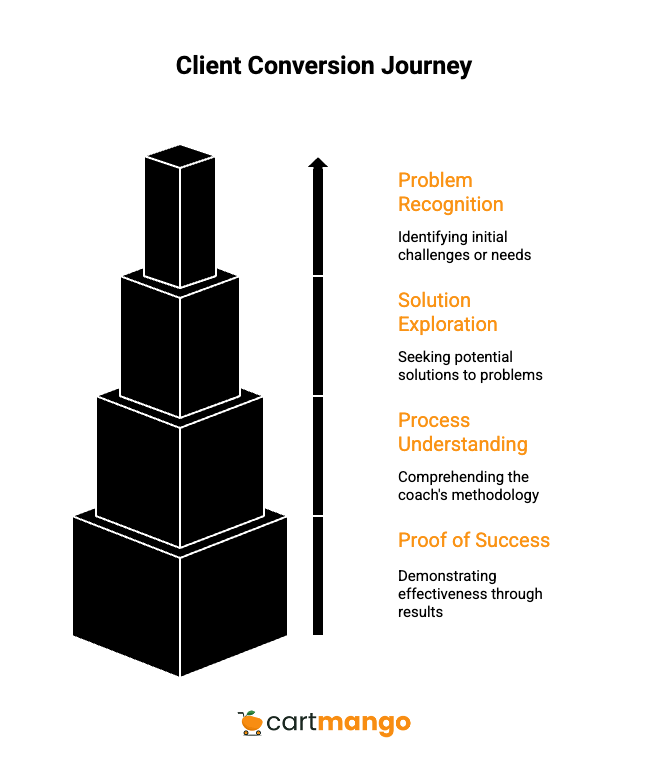
Most coaches are creating content that educates but never converts. I was guilty of this too until I discovered the psychology behind how people actually hire coaches.
Your potential clients are on a journey. They start by recognizing a problem, then look for solutions, want to understand your process, and finally need proof it works.
Your content needs to match each stage of this journey.
Article Type 1: Problem Identification
These articles help people realize they need coaching help. Headlines like “5 Signs You Need a Career Coach” or “Why Successful Women Still Feel Stuck” work because they speak to that nagging feeling something isn’t right.
I’ve seen coaches struggle because they jump straight to solutions. But people need to feel understood before they’re ready to buy. Start by validating their experience and showing you truly get what they’re going through.
Write these from a place of empathy, not expertise. Share stories of clients who felt the same way before finding help. Use specific details that make your ideal client nod their head in recognition.
Article Type 2: Solution
Now you can introduce coaching as the solution.
But don’t just say “coaching helps.” Explain specifically how your methodology addresses the problems you identified in Article Type 1.
Perhaps the most powerful approach is to contrast coaching with other solutions they’ve probably tried. “Why therapy didn’t solve your career confusion” or “The difference between business coaching and consulting” help position your services correctly.
Article Type 3: Process
People are naturally nervous about trying something new. This article removes the mystery by walking them through exactly what happens when they work with you.
Cover the practical details:
- How long are sessions?
- What happens in the first meeting?
- How do you measure progress?
The more specific you get, the more comfortable potential clients become.
Try to include what clients should expect to feel during the process. Coaching can bring up emotions and resistance. Preparing people for this makes them more likely to stick with the work.
Article Type 4: Results Showcase
This is where you share real client transformations. But here’s the trick most coaches miss – focus on the journey, not just the destination. People need to see themselves in your client’s starting point.
Share specific metrics when possible.
“Sarah went from earning $45,000 to $85,000 within 8 months” is more compelling than “Sarah increased her income.”
Include the struggles and setbacks too. Real transformation is messy.
Content writing templates can help you structure each article type, but the real magic happens when you customize them for your specific coaching niche and client journey.
Each article should naturally lead to the next one. Link between them strategically to guide readers through your complete system. This approach turns your blog into a powerful sales funnel that works even while you sleep.
Get Found by “Local” Clients
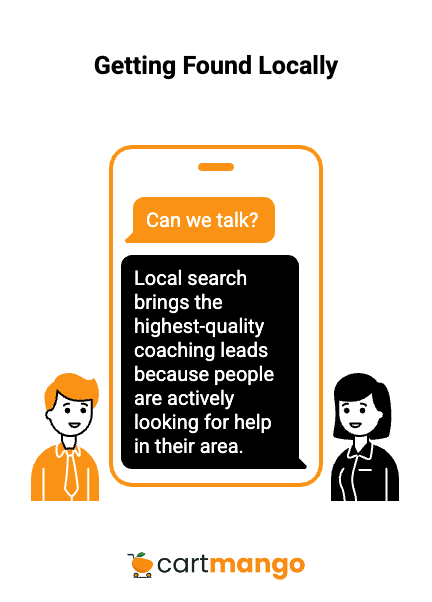
The phone rang at 7 PM on a Tuesday. “I found you on Google when I searched for marriage coaches in Denver. Can we talk?”
Imagine getting a call like that.
Local search brings the highest-quality coaching leads because people are actively looking for help in their area.
3 out of 4 people who use their phone to find a local business will actually show up at that business within 24 hours. (Source)
Google Business Profile: Your Local SEO Foundation
Your Google Business Profile is often the first thing potential clients see. Coaches can lose clients because their profile looked abandoned or unprofessional.
Start with your category selection. Google has specific categories for different types of coaches. Choose the most relevant primary category, then add secondary categories that describe your specialties.
Your business description should include location-based keywords naturally.
- Instead of “I help people achieve their goals,”
- Try “I help Denver professionals overcome career transitions and find work they love.”
Upload high-quality photos that show your personality and professionalism. Include shots of your office space, yourself in action, and any certifications or awards.
People hire coaches they trust, and photos build that trust before the first conversation.
The 5-Review System
Reviews make or break local SEO rankings. (Source)
My 5-review system focuses on getting your first 5 reviews quickly and authentically.
- Start with your most satisfied past clients.
- Send a simple email explaining how reviews help other people find the support they need.
- Provide direct links to your Google Business Profile review section.
- Make it as easy as possible for people to leave feedback. The harder you make it, the less likely they are to follow through.
- Respond to every review, positive and negative. Your responses show potential clients how you handle feedback and communication. Keep responses professional but let your personality shine through.
Directory Submissions That Matter
Not all directories are worth your time. Focus on the ones that actually impact local search rankings and send qualified traffic.
Psychology Today is crucial for coaches who work with mental health and relationship issues. The directory ranks well for coaching-related searches and allows detailed profiles that showcase your expertise.
Local business directories like your Chamber of Commerce website, city business listings, and neighborhood guides help establish local relevance. These links tell Google you’re truly part of the local business community.
Professional coaching organization directories add credibility and often rank well for niche-specific searches. The International Coaching Federation (ICF) directory is particularly valuable for credentialed coaches.
Emphasize consistency across all listings. Your business name, address, and phone number must match exactly across every platform. Even small differences can hurt your rankings.
Your Local SEO Checklist:
- Optimize Google Business Profile with niche-specific categories
- Get 5 authentic reviews within 30 days
- Submit to 3 relevant professional directories
- Ensure consistent NAP (Name, Address, Phone) across all listings
- Create location-based content for your website
Local SEO takes time to build momentum, but the results are worth the effort. Local clients often become your best referral sources because they can recommend you to friends and colleagues in the same area.
Technical SEO Made Simple
I used to think technical SEO for coaches was only for web developers.
Then I realized that coaches are losing potential clients every day because their websites are slow, confusing, or hard to use on mobile devices.
The good news is you don’t need to become a tech expert. These 30-minute fixes will handle 80% of the technical issues that hurt coaching websites.
The 30-Minute Technical Audit
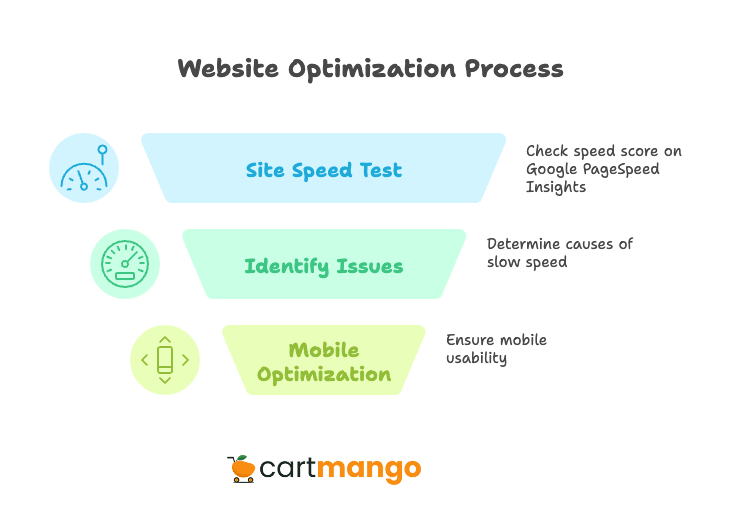
Start with a site speed test using Google PageSpeed Insights. Enter your website URL and wait for the analysis. If your speed score is below 70, you have work to do.
The tool tells you exactly what’s slowing down your site. Usually it’s oversized images, too many plugins, or hosting issues. Most problems have simple solutions that don’t require coding knowledge.
- Test your website on your phone right now.
- Can you easily book a consultation?
- Is your phone number clickable?
Mobile optimization isn’t optional when most searches happen on mobile devices.
Quick Fixes That Make a Big Difference
Large image files are the number one cause of slow coaching websites.
Compress your images before uploading them. I use TinyPNG for this. It’s free and reduces file sizes by up to 70% without affecting quality.
If you’re using WordPress, audit your plugins. Every plugin slows down your site a little. Remove any you’re not actively using. Keep only the ones that directly support your business goals.
SSL certificates are non-negotiable. If your website URL doesn’t start with “https,” you need to fix this immediately. Most hosting companies provide free SSL certificates, and the setup usually takes less than 5 minutes.
Coaching-Specific Tech Considerations
Your appointment booking system needs to work flawlessly. Test it yourself monthly by going through the entire booking process. Broken booking systems cost coaches thousands in lost revenue.
Client portal integration should be seamless. If you use coaching software or client management systems, make sure they integrate smoothly with your website. Clients shouldn’t have to juggle multiple platforms.
Privacy and confidentiality features matter more for coaches than other businesses. Your contact forms should be secure, and your privacy policy should clearly explain how you protect client information.
This guide covers more “site-speeding” techniques, but start with the basics. A fast, mobile-friendly website beats a slow, feature-packed one every time.
Your 30-Minute Technical Checklist:
- Run Google PageSpeed Insights test
- Compress all images on key pages
- Test mobile booking process
- Verify SSL certificate is active
- Remove unused plugins
Technical SEO isn’t about perfection. It’s about removing barriers between potential clients and your coaching services. Every second of load time you eliminate could be the difference between a consultation booked and a visitor lost forever.
Link Building for Coaches: 1 Hour Per Week Strategy
Link building can feel sleazy and complicated. But coaches have natural advantages for earning high-quality links.
People want to share resources that help others. As a coach, you’re already creating valuable content and building relationships. You just need to be more strategic about turning those relationships into links.
Week 1: Professional Association Directories
Every coaching niche has professional organizations. The International Coach Federation, local business coaching chapters, specialty associations for health coaches or executive coaches.
Most of these directories are free to join and include website links. But here’s what most coaches miss: these aren’t just SEO opportunities. They’re networking goldmines.
Spend 15 minutes per week updating your directory profiles. Fresh content and new achievements make your listing more likely to appear in directory searches. This brings both SEO value and potential referrals.
Week 2: Industry Publication Guest Posts
Local business journals, coaching magazines, and niche publications always need fresh content. Your expertise is exactly what they’re looking for.
Start small with local publications.
The city business journal, chamber of commerce newsletter, or industry trade publications that serve your clients. These publications often have websites that rank well for local business searches.
Pitch specific, actionable topics. “5 Communication Mistakes That Kill Leadership Effectiveness” works better than “How to Be a Better Leader.” Editors want content their readers can use immediately.
Week 3: Podcast Guest Appearances
Podcasting is huge in the coaching space. Hosts are constantly looking for expert guests who can provide value to their audiences.
Most podcast websites include guest bio pages with links back to your website. These links come from relevant, authoritative sources that Google values highly.
The relationship building aspect is even more valuable than the SEO benefits. Podcast appearances can lead to speaking opportunities, joint ventures, and referral partnerships.
Week 4: Speaking Engagement Opportunities
Conference websites, event pages, and speaker bio sections all provide natural link-building opportunities.
Every speaking engagement should result in at least one high-quality backlink.
Professional speaker directories are another underutilized resource. Many rank well for search terms related to coaching and speaking services.
Create a simple speaker one-sheet that makes it easy for event organizers to promote you. Include your bio, topic descriptions, and high-quality headshots. The more professional you make it, the more likely organizers are to link to your website.
Relationship-based strategies outperform mass outreach campaigns. The personal connections you build matter more than the immediate SEO benefits.
Your Weekly Link Building Schedule:
- Week 1: Update 2 directory profiles (15 minutes)
- Week 2: Send 1 guest post pitch (15 minutes)
- Week 3: Apply to be a podcast guest (15 minutes)
- Week 4: Look for speaking opportunities (15 minutes)
This approach feels natural because it aligns with activities you should already be doing to grow your coaching practice. The SEO benefits are just a bonus on top of the networking and business development value.
The 3 Metrics That Predict Revenue
I used to obsess over website traffic numbers. More visitors felt like progress, even when my bank account told a different story.
The wake-up call came when I looked at my analytics and realized I had great traffic but terrible conversion rates. I was attracting the wrong people with the wrong content.
Metric 1: Consultation Booking Rate from Organic Traffic
This is the only metric that actually predicts coaching revenue. You can have thousands of visitors, but if they’re not booking consultations, your SEO for coaches strategy is broken.
Track this monthly. Take the number of consultation requests from organic search traffic and divide by your total organic visitors. Multiply by 100 to get your percentage.
A good consultation booking rate for coaches is 2-5%. If you’re below 2%, your content isn’t attracting qualified prospects. If you’re above 5%, you’re either in a very hot niche or you’ve cracked the code on conversion optimization.
Metric 2: Search Ranking Positions
Rankings matter, but only for the keywords that actually bring clients. Track 10-15 of your most important keywords monthly. Focus on the terms that directly relate to hiring a coach in your niche.
Use a simple spreadsheet to track rankings. Check your positions on the same day each month to avoid daily fluctuations. Look for trends over 3-6 month periods rather than worrying about weekly changes.
Don’t just track your own rankings. Keep an eye on your main competitors too. If they’re rising for important keywords, study what they’re doing differently.
Metric 3: Google Business Profile Engagement
For local coaches, this metric often predicts success better than website traffic. Track phone calls, direction requests, and website clicks from your Google Business Profile.
High engagement here means you’re showing up for the right local searches. Low engagement suggests your profile needs optimization or you’re not ranking for local terms yet.
This guide from Google walks through the technical Google Analytics setup, but the real value comes from tracking the right metrics consistently.
Your 10-Minute Weekly Tracking Routine:
- Check consultation bookings from last week
- Review Google Business Profile insights
- Note any ranking changes for top 5 keywords
- Update tracking spreadsheet
The key is tracking consistently without getting overwhelmed by data. These three metrics tell you everything you need to know about whether your SEO efforts are working.
When consultation bookings increase month over month, you know you’re on the right track. When they plateau or decline, it’s time to audit your strategy and make adjustments.
Your 90-Day Implementation Plan
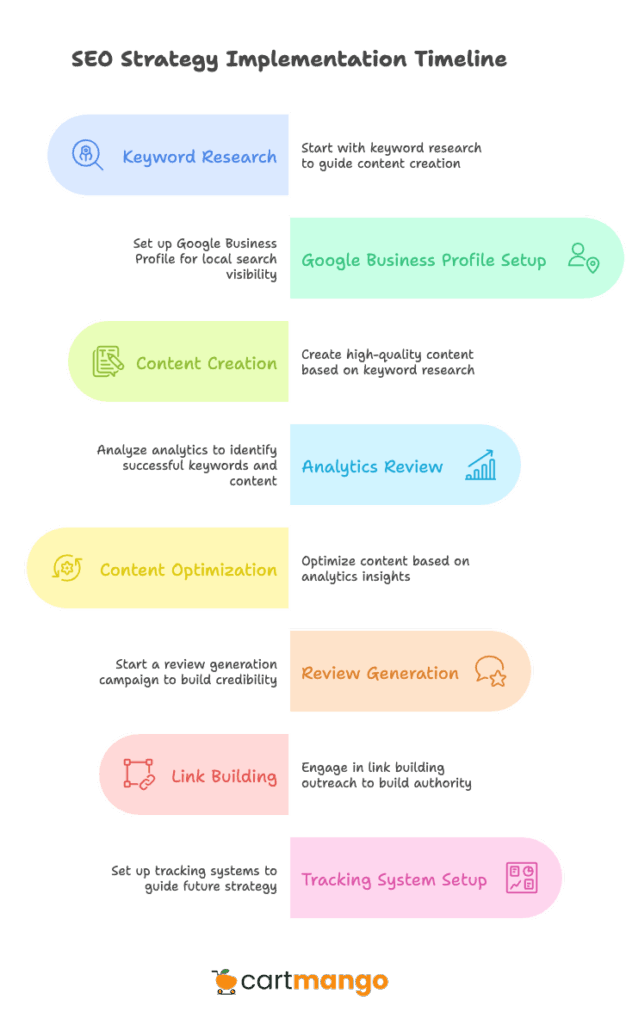
Here’s what nobody tells you about SEO for coaches: it’s not complicated, but it does take consistent action over time.
This 90-day plan breaks everything down into manageable weekly tasks:
Time Period | Primary Focus | Key Tasks | Deliverables | Time Investment |
|---|---|---|---|---|
Days 1-30 Foundation Setup | Keyword Research & Local SEO | – Complete niche keyword research – Set up Google Business Profile – Create first 4 content pieces – Perform technical audit – Submit to key directories | – Targeted keyword list (20+ keywords) – Optimized Google Business Profile – 4 SEO-optimized articles – Technical SEO checklist completed – 5 directory submissions | 30-40 hours total (6-8 hours/week) |
Days 31-60 Content & Optimization | Content Creation & On-Page SEO | – Expand content series (8 more articles) – Optimize existing service pages – Complete local directory submissions – Launch review generation campaign – Implement technical fixes | – 8 additional niche-specific articles – Optimized service/about pages – 15 total directory listings – First 10 Google reviews – Improved site speed/mobile scores | 24-30 hours total |
Days 61-90 Authority Building | Link Building & Performance Tracking | – Execute link building outreach – Pitch for podcast guest appearances – Set up analytics tracking – Monitor and adjust strategy – Plan content for next quarter | – 10 quality backlinks acquired – 2 podcast guest appearances – Monthly SEO report system – Refined keyword strategy – Q2 content calendar | 20-24 hours total |
Month 1: Building Your Foundation
The first month feels like drinking from a fire hose. You’re setting up systems, creating content, and learning new skills all at once. That’s normal.
Start with keyword research on day one. Everything else builds on this foundation. Take your time getting this right because rushing leads to targeting the wrong terms for months.
Your Google Business Profile setup should happen in week one. This is often the fastest way to start appearing in local search results. Don’t skip the photo uploads or business description optimization.
The first four articles you create will likely be your best-performing content for months. Use your keyword research to guide the topics, but focus on providing real value to potential clients. Quality beats quantity every time.
Month 2: Content and Optimization
By month two, you should have a clear picture of what’s working.
- Your analytics will start showing which keywords are bringing traffic and
- Which content pieces are resonating with readers
This is when you double down on what’s working. If one article is performing well, create more content around that topic. If certain keywords are starting to rank, optimize existing pages for related terms.
The review generation campaign should start producing results. Most coaches find that asking for reviews is easier than they expected. Satisfied clients usually want to help you succeed.
Month 3: Authority Building
Month three is when your SEO for coaches plan starts getting fun.
You’re building real relationships through link building outreach.
- You’re seeing your content rank on the first page of Google.
- You’re getting consultation requests from people who found you online.
Link building becomes easier once you have quality content to share. People are more willing to link to helpful resources than to promotional material.
The tracking systems you set up in month three will guide your strategy for months to come. Good data helps you double down on what’s working and abandon what isn’t.
More SEO Stuff
SEO Basics: What Happens After Your 90 Days
You’ve completed your 90-day plan. Now what?
Search engine optimization doesn’t stop after three months. Think of SEO basics as the foundation you’ve built – now it’s time to expand.
Search engines like Google are constantly updating how they find and rank websites. What worked yesterday might need tweaking tomorrow. But don’t worry: successful SEO isn’t about chasing every change. SEO focuses on one simple truth: helping real people find helpful content.
Most coaches get overwhelmed here. They think they need to become technical experts overnight. You don’t. The fundamentals you’ve learned will carry you far.
More Keyword Strategies
Let’s talk about SEO keywords in plain English. You started with basic relevant keywords in your 90-day plan. Now it’s time to dig deeper.
Long tail keywords are your secret weapon. Instead of trying to rank for “life coach,” target “life coaching keywords” like “life coach for working moms in Chicago.” These longer phrases match exactly what your target audience types into google search.
Here’s how real people search. They don’t type “coach.” They type things like “I need help with my career” or “how to find confidence after divorce.” Those exact phrases become your keywords related to coaching.
Secondary keywords support your main ones. If your main keyword is “career coach,” your secondary keywords might include “job transition help” or “professional development.” Use tools to check search volumes – you want keywords people actually search for.
The trick is thinking like your clients. What would someone type into google search at 2 AM when they’re stressed about their life? That user’s search query becomes your content opportunity. Track these search queries and you’ll never run out of content ideas.
Finding the right keywords takes practice, but it’s worth the effort. The right keywords connect you with people who actually need your help.
More Tech Stuff
Meta descriptions are the short summaries under your links in Google. Write them like mini advertisements for your content. Title tags are the clickable headlines in search results. Both should include your main keywords naturally.
Google Search Console is your free dashboard from Google. It shows which keywords bring people to your site and which pages need help. Check it weekly – it’s like having a conversation with Google about your website.
On page optimization means making each web page or website page easy for Google to understand. Use your keywords in headings, but don’t stuff them everywhere. Write for humans first, search engines second.
Off page SEO happens away from your website. This includes getting external links from other websites, building your reputation on social media, and earning mentions in industry publications. Off page SEO tells Google that other people trust your content.
Internal links connect your pages together. When you mention a related topic, link to another article on your site. External links point to other helpful websites. Both tell Google your content is connected and trustworthy.
Focus on your important pages first – your homepage, about page, and main service pages. Get these right before worrying about every single blog post.
More Content Tips
Every blog post you write should serve two masters: your readers and search engines. SEO friendly blog posts aren’t stuffed with keywords. They’re genuinely helpful articles that happen to use the right terms naturally.
Your coaching blog should answer real questions your clients ask. When you create high quality content consistently, Google notices. High quality content isn’t about perfect grammar or fancy words. It’s about solving real problems.
Relevant content matches what people actually need.
- If you’re a business coach, write about business challenges.
- If you’re a relationship coach, address relationship struggles. Sounds obvious, but many coaches write about everything instead of staying focused.
Writing content becomes easier when you know your keywords. Instead of staring at a blank screen wondering what to write, you have a list of topics people are searching for.
The goal is to rank higher on the search results page. But ranking isn’t the real goal – helping people is. When you focus on helping, ranking follows naturally. Track your progress in search engine results and celebrate small wins.
Search visibility grows slowly, then suddenly. One day you’ll Google a phrase and see your blog post at the top. That moment makes all the work worth it.
Integrating SEO with Your Marketing Strategy
Successful SEO strategy doesn’t live in isolation. It connects with everything else you do to grow your coaching practice.
Your marketing strategy should blend organic search with other channels. Paid advertising can jump-start your visibility while SEO builds long-term results. Paid ads and Google Ads give immediate traffic, but they stop when you stop paying.
Here’s where it gets interesting. Use paid ads to test which keywords convert best. Then create organic content around those winning keywords.
Many coaches wonder if they need an SEO consultant or SEO agency. If you’re just starting, learn the basics yourself first. Once you’re making good money from SEO, then consider hiring help to scale faster.
Getting your business online isn’t just about having a website anymore. It’s about being found when people need you most.
Your “SEO for Coaches” Success Depends on This
SEO is a marathon, not a sprint.
The coaches who treat it like a long-term investment in their business are the ones who build sustainable, profitable practices.
- Start with your strongest niche focus from the strategy table.
- Use the time estimates to plan your weekly schedule realistically.
- Track progress weekly using the metrics we discussed.
Most importantly, adjust the strategy based on your specific coaching niche and client needs. This framework works, but you might need to adapt it for your unique situation.
The next 90 days could transform how your coaching business shows up online. But only if you start today and stick with the plan even when progress feels slow.
